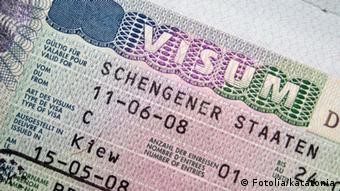
Reasons for Rejection of German Student Visa
Germany is the place to be when it comes to the quality of higher education, low cost of education, research infrastructure, career prospect, and world-class teaching methodology. Known for its tuition-free university education, Germany is the most popular non-anglophone study destination among foreign students. The acceptance rate of German student visa is 92% which is more than the United States (80%) and the United Kingdom (85%).
Unlike other consulates, the choice by a German embassy to issue or deny a visa isn't exclusively subject to the visa officer. It is primarily reliant on the Immigration Office. All the visa official does is to give a positive or negative feedback dependent on your exhibition at the visa interview. Hence, you do well at the interview and still have your German student visa rejected. You may likewise do inadequately at the interview and be shocked to discover that you have been given a visa.
1. Incorrect Visa Application
Visa for international students willing to study abroad in Germany fall in 3 categories:
1. Student visa
2. Student application visa
3. Language course visa
Suggestion
As every type of student visa has different requirements, that is why it is important to apply for the one relevant to the student and gather documents, information as per that.
* Student Visa is applicable for international students admitted to a German universities and is about to start their full-time course at a German university.
* Student application visa is applicable if a student needs to be in Germany to apply for university admission in person.
* A language course visa is required if a student is willing to study the German language course.
2. Lack of Financial Stability
You must already know that finances are a really important means of survival. Now, if you’re entering a foreign country as a student, the country will want you to have enough money to cover your expenses during your studies. This means that they will require you to provide proof of financial stability as a requirement of your visa application. This is one of the most important requirements, so failure to duly fulfil this one, will lead to a visa rejection.
As of 2021, the mandatory amount estimated to cover a student is €10,332 per year. This means a student must have at least €861 per month, in order to live comfortably in Germany. The most frequent way of proving financial stability to the German embassy is through a German blocked account. It is basically a bank account through which you can withdraw an amount of €861 per month, but not more.
What Can I Do to Avoid This?
Avoiding a lack of financial stability is self-explanatory. However, there are tips we could give you when it comes to making sure you present your finances neatly and concisely and avoid any misunderstanding. The German blocked account, as mentioned, is the best way of proving financial stability. Depending on the duration of your stay, you should have enough money in your account to prove you have access to at least €861 monthly.
Your sponsor does not necessarily have to be a family member, it simply has to be someone willing to sponsor you. They must, however, prove that they have sufficient means to do so as well. Among others, they are required to show that they have a regular monthly income and that they are not sponsoring more people that they can handle. The embassy checks all of these details and if they see something is not right, they have the right to reject your visa application.
3. Lack of Satisfactory Academic Achievements
Germany is highly-regarded for its education system which is also perceived as one of the most difficult in Europe. To ensure that international students entering Germany are motivated and skilled enough to successfully complete a degree, the German authorities go through and previous academic achievements of the candidate.
Suggestion
If your academic record is not up to the mark, you can prove your competence in the interview.
In case of a genuine reason why marks were not attained, it can be explained in the interview.
- Make the reason clear in the motivation letter as well.
- Try to improvise and strengthen other aspects of your application to compensate for the low marks to avoid German student visa rejection.
- Mention relevant work experience on the program opted, or an additional certificate or diploma course you went through.
- Secure top-notch scores in GRE especially in the quantitative section.
4. Inability to Meet the Language Requirements
Inability to meet the language requirements is one of the major factors why your student visa might get rejected. Since German-taught courses in Germany require German language proficiency, there is a chance that the interview will also be conducted in German. If you fail to communicate with the officers in German, then you will immediately be disregarded. You are also required to show proof that you are fluent in English as well.
5. Inconsistent Choice of Study Programs
Inconsistency in the choice of study programs becomes evident when a student's choice of MS program in Germany is completely aloof from what is studied at the bachelor’s level. If your undergraduate major was history and you are applying for a master's in management, your choice of fields will raise questions regarding your choice of study programs. Visa officers might deny you the visa on the grounds of inconsistency.
Moreover, if a student applies for double master’s or bachelor’s which is not well regarded in Germany. This can reflect that a student is merely desperate and lacks interest in the area of study.
Suggestion
If you decide to switch careers and pursue something else, ensure you have proof of work or other experiences within the new field in order to justify the shift. The visa officer and the motivation letter both should include the intent of changing the program clearly.
Ideal to apply to a master’s program related to your undergraduate studies. In case you applied for a doctorate degree and it got denied due to lack of enough academic experience, a double master's degree can be justified on that ground to avoid having this reason for German student visa rejection.
6. Lack of Preparation of Your Interview
A few students go for the interview unprepared and give no responses or incorrect answers. This makes the visa officer doubt their sincerity to study in Germany and decline the student visa.
The visa interviewer expects you to have basic knowledge of the country, state, the city of the prospective university, and the study program.
Suggestion
- For plain sailing, you should try to understand the purpose of the questions posed in the interview.
- Questions are asked to assess:
* Your knowledge of Germany
* Willingness for the course
* Motive to study
*Financial standing to cover living costs.
* Ensure you are well aware of the country and your study program.
What to do after German Student Visa Rejection?
There goes a saying that life always gives a second chance, so do not get disappointed even if on the first instance the visa gets rejected.
1. Understand the reason for German student visa rejection: Identify the reasons that led to the rejection
2. Write an appeal to the embassy: This is a crucial step, as it has to be in a convincing manner providing strong reasons.
3. Additional evidence can be provided to prove the eligibility and overturn the rejection decision.
4. Clear backlogs if any: Backlogs have a direct impact on university admission and not on visa approval. But it is necessary to understand the visa approval process. If the university denies admission based on backlogs, the visa process will be automatically stalled.
If you appeared for a visa interview, you can request the visa officer for the reason of rejection. In case, you were not called for the interview, you will receive a document stating the grounds for declination. Understand there are two forms of approvals, foremost is receiving the offer letter from the university and then getting the visa stamped. University application is needed to explain why a particular course is to be opted in the chosen college, whereas a student visa application is written to elaborate on your desire to study abroad in Germany. So there are three steps to overcome the problem if your student visa is denied- understand the reason, over the problem, and reapply on time.


